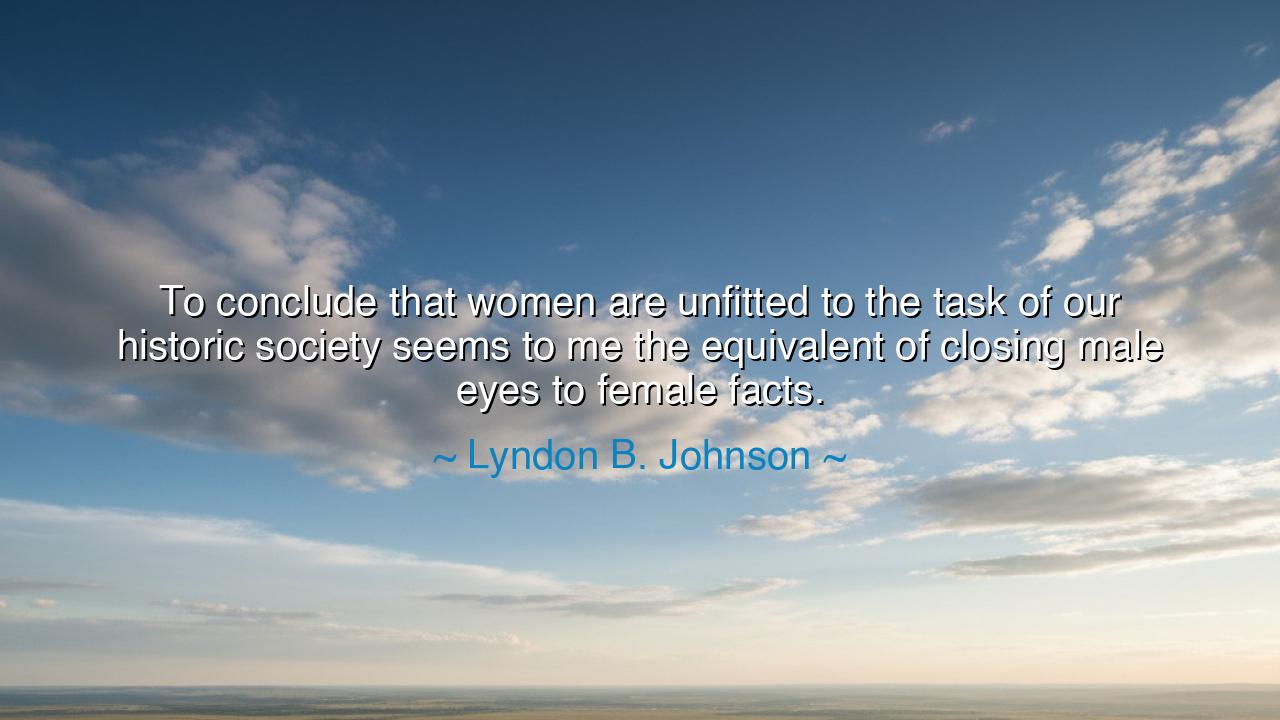
To conclude that women are unfitted to the task of our historic
To conclude that women are unfitted to the task of our historic society seems to me the equivalent of closing male eyes to female facts.






Hear the words of Lyndon B. Johnson, spoken with the weight of history and the fire of justice: “To conclude that women are unfitted to the task of our historic society seems to me the equivalent of closing male eyes to female facts.” This is not merely a political statement, but a rebuke against blindness—a call to open the eyes of a nation that had long refused to see what was plain before it. Johnson names the truth that had too often been denied: that the strength, the wisdom, and the endurance of women are as essential to society as those of men. To deny this is not reason, but willful ignorance, a refusal to see what has always been there.
The origin of these words lies in the 1960s, an age of upheaval and transformation. The United States was struggling through the battles of civil rights, the protests of war, and the demands of equality from those who had long been silenced. Johnson, who had signed the Civil Rights Act of 1964 and the Voting Rights Act of 1965, also turned his voice toward women’s equality, recognizing that a society could not be whole if half its citizens were left in shadow. His words carried the weight of a president who understood that denying women’s worth was not simply injustice, but folly.
Consider the story of the women who carried the burden of World War II. When the men went abroad to fight, it was women who built the planes, forged the weapons, tilled the soil, and kept the engines of the nation turning. “Rosie the Riveter” was not a symbol of frailty, but of indomitable power. Yet, when the war was done, those same women were told to step aside, to return quietly to the kitchen, as though their labor had been an illusion. Here lies the blindness Johnson condemns: the refusal to see the female facts—the undeniable truth of women’s capability and contribution.
The meaning of his quote is both clear and profound: that to doubt women’s ability to take part in shaping history is to shut one’s eyes to reality itself. Women have always been warriors, leaders, healers, and thinkers. From Joan of Arc rallying a nation, to Harriet Tubman leading enslaved people to freedom, to the countless nameless mothers who built families in poverty and war, the evidence is overwhelming. To ignore it is not logic, but blindness, chosen and cultivated by those who feared sharing power.
Yet Johnson’s words are not only criticism—they are also a summons. They challenge men, especially those in power, to open their eyes, to shed the blindness of arrogance, and to welcome women as equals in the grand task of building society. For history is not shaped by one sex alone; it is forged by the union of all voices, all gifts, all strengths. A nation that silences women is a nation that cuts itself in half, crippling its own potential.
The lesson for us is this: do not ignore what is before your eyes. Recognize the contributions of those whom society tries to render invisible. Whether in the workplace, in the home, in politics, or in culture, do not mistake exclusion for incapacity. Justice begins when we open our eyes to the facts we have long ignored, and courage begins when we act upon them. Johnson’s call is not only to men of his time, but to all generations: to look honestly, to admit truth, and to honor it in action.
What then shall you do? Support women not only with words, but with deeds. Share power, opportunities, and responsibilities. Teach children that leadership is not bound by gender, but by character. Honor the history of women who built the world alongside men, and ensure their future is no longer one of silence, but of equal voice. Refuse to be blind, for blindness is not ignorance, but choice. Choose instead to see, and in seeing, to act.
So let Lyndon B. Johnson’s words stand as both rebuke and beacon: women, society, eyes, facts. For the truth has always been before us, waiting to be acknowledged. Women are not unfit—they are indispensable. And when society at last opens its eyes to this eternal fact, it shall rise not crippled, but whole, not divided, but strong.






AAdministratorAdministrator
Welcome, honored guests. Please leave a comment, we will respond soon